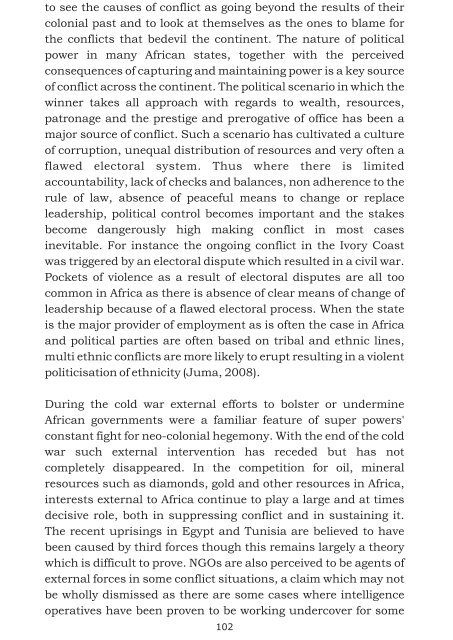Beneficiaries are actors too.pdf - Southern Institute of Peace ...
Beneficiaries are actors too.pdf - Southern Institute of Peace ...
Beneficiaries are actors too.pdf - Southern Institute of Peace ...
Create successful ePaper yourself
Turn your PDF publications into a flip-book with our unique Google optimized e-Paper software.
to see the causes <strong>of</strong> conflict as going beyond the results <strong>of</strong> their<br />
colonial past and to look at themselves as the ones to blame for<br />
the conflicts that bedevil the continent. The nature <strong>of</strong> political<br />
power in many African states, together with the perceived<br />
consequences <strong>of</strong> capturing and maintaining power is a key source<br />
<strong>of</strong> conflict across the continent. The political scenario in which the<br />
winner takes all approach with regards to wealth, resources,<br />
patronage and the prestige and prerogative <strong>of</strong> <strong>of</strong>fice has been a<br />
major source <strong>of</strong> conflict. Such a scenario has cultivated a culture<br />
<strong>of</strong> corruption, unequal distribution <strong>of</strong> resources and very <strong>of</strong>ten a<br />
flawed electoral system. Thus where there is limited<br />
accountability, lack <strong>of</strong> checks and balances, non adherence to the<br />
rule <strong>of</strong> law, absence <strong>of</strong> peaceful means to change or replace<br />
leadership, political control becomes important and the stakes<br />
become dangerously high making conflict in most cases<br />
inevitable. For instance the ongoing conflict in the Ivory Coast<br />
was triggered by an electoral dispute which resulted in a civil war.<br />
Pockets <strong>of</strong> violence as a result <strong>of</strong> electoral disputes <strong>are</strong> all <strong>too</strong><br />
common in Africa as there is absence <strong>of</strong> clear means <strong>of</strong> change <strong>of</strong><br />
leadership because <strong>of</strong> a flawed electoral process. When the state<br />
is the major provider <strong>of</strong> employment as is <strong>of</strong>ten the case in Africa<br />
and political parties <strong>are</strong> <strong>of</strong>ten based on tribal and ethnic lines,<br />
multi ethnic conflicts <strong>are</strong> more likely to erupt resulting in a violent<br />
politicisation <strong>of</strong> ethnicity (Juma, 2008).<br />
During the cold war external efforts to bolster or undermine<br />
African governments were a familiar feature <strong>of</strong> super powers'<br />
constant fight for neo-colonial hegemony. With the end <strong>of</strong> the cold<br />
war such external intervention has receded but has not<br />
completely disappe<strong>are</strong>d. In the competition for oil, mineral<br />
resources such as diamonds, gold and other resources in Africa,<br />
interests external to Africa continue to play a large and at times<br />
decisive role, both in suppressing conflict and in sustaining it.<br />
The recent uprisings in Egypt and Tunisia <strong>are</strong> believed to have<br />
been caused by third forces though this remains largely a theory<br />
which is difficult to prove. NGOs <strong>are</strong> also perceived to be agents <strong>of</strong><br />
external forces in some conflict situations, a claim which may not<br />
be wholly dismissed as there <strong>are</strong> some cases where intelligence<br />
operatives have been proven to be working undercover for some<br />
102


